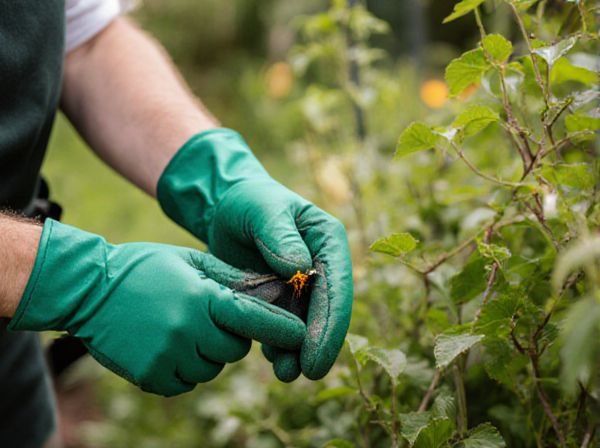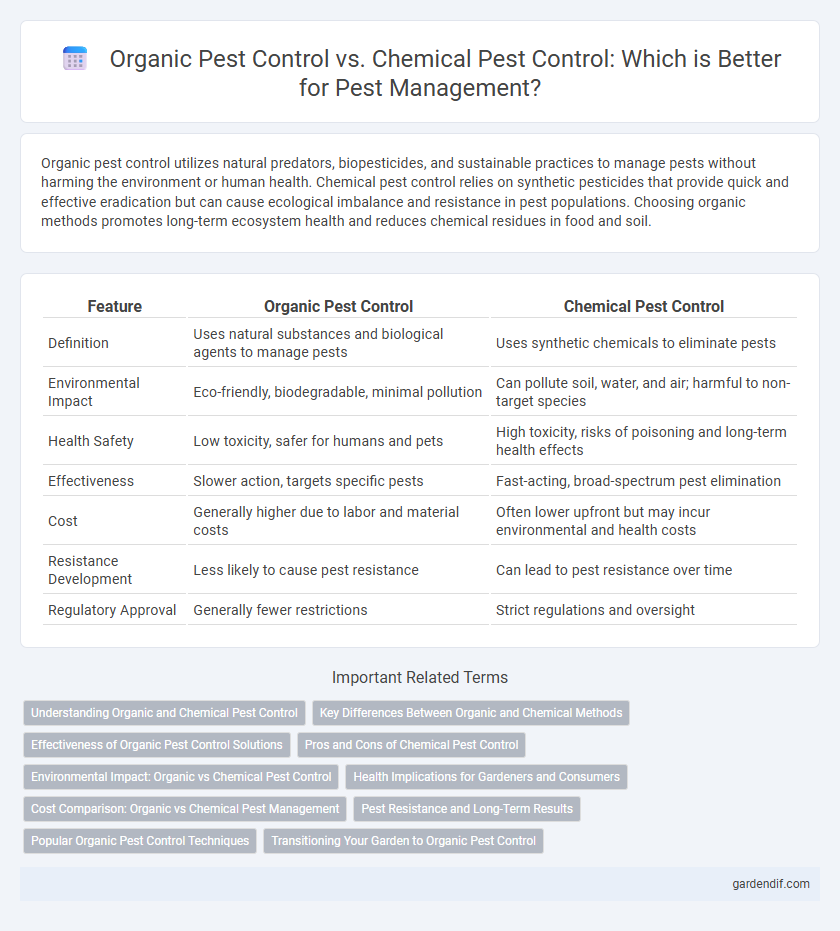
Organic pest control vs chemical pest control Illustration
Organic pest control utilizes natural predators, biopesticides, and sustainable practices to manage pests without harming the environment or human health. Chemical pest control relies on synthetic pesticides that provide quick and effective eradication but can cause ecological imbalance and resistance in pest populations. Choosing organic methods promotes long-term ecosystem health and reduces chemical residues in food and soil.
Table of Comparison
| Feature | Organic Pest Control | Chemical Pest Control |
|---|---|---|
| Definition | Uses natural substances and biological agents to manage pests | Uses synthetic chemicals to eliminate pests |
| Environmental Impact | Eco-friendly, biodegradable, minimal pollution | Can pollute soil, water, and air; harmful to non-target species |
| Health Safety | Low toxicity, safer for humans and pets | High toxicity, risks of poisoning and long-term health effects |
| Effectiveness | Slower action, targets specific pests | Fast-acting, broad-spectrum pest elimination |
| Cost | Generally higher due to labor and material costs | Often lower upfront but may incur environmental and health costs |
| Resistance Development | Less likely to cause pest resistance | Can lead to pest resistance over time |
| Regulatory Approval | Generally fewer restrictions | Strict regulations and oversight |
Understanding Organic and Chemical Pest Control
Organic pest control utilizes natural substances such as neem oil, diatomaceous earth, and beneficial insects to manage pests without harmful chemicals, promoting environmental sustainability and reducing health risks. Chemical pest control involves synthetic pesticides that provide fast and effective elimination of pests but may cause ecological damage and affect non-target species. Understanding the differences helps in choosing methods based on pest severity, environmental impact, and safety considerations.
Key Differences Between Organic and Chemical Methods
Organic pest control uses natural predators, biopesticides, and cultural practices to manage pests, minimizing environmental impact and promoting biodiversity. Chemical pest control relies on synthetic pesticides that provide rapid and broad-spectrum pest elimination but may cause soil and water contamination, resistance development, and harm to non-target organisms. Organic methods prioritize sustainability and soil health, whereas chemical methods emphasize immediate effectiveness and cost-efficiency in pest management.
Effectiveness of Organic Pest Control Solutions
Organic pest control solutions leverage natural predators, biopesticides, and plant-based repellents to effectively manage pest populations while minimizing environmental impact. Their effectiveness depends on careful monitoring and application, often resulting in sustainable pest suppression without the resistance issues common to chemical pesticides. Studies show organic methods achieve comparable results to chemical controls in integrated pest management systems, promoting ecosystem health and crop safety.
Pros and Cons of Chemical Pest Control
Chemical pest control offers rapid and effective elimination of a wide range of pests, often providing immediate results critical for large-scale agricultural operations. However, it poses significant risks such as environmental pollution, harm to non-target species, and potential development of pesticide resistance. Despite its efficiency, chemical methods may lead to long-term ecological imbalances and health concerns for humans and wildlife.
Environmental Impact: Organic vs Chemical Pest Control
Organic pest control minimizes environmental harm by using natural predators and biopesticides, promoting biodiversity and soil health without toxic residues. Chemical pest control often leads to pollution, harming non-target species and contaminating soil and water sources with persistent synthetic compounds. Choosing organic methods supports sustainable ecosystems and reduces long-term ecological damage from chemical buildup.
Health Implications for Gardeners and Consumers
Organic pest control methods reduce exposure to harmful synthetic chemicals, minimizing health risks such as respiratory issues and skin irritation for gardeners. Chemical pest control often involves the use of pesticides that can leave toxic residues on plants, posing ingestion risks to consumers including neurotoxicity and hormone disruption. Choosing organic options supports safer food production and promotes long-term well-being for both growers and end-users.
Cost Comparison: Organic vs Chemical Pest Management
Organic pest control generally incurs higher upfront costs due to natural ingredient sourcing and labor-intensive application methods, with prices ranging from $50 to $200 per treatment depending on the pest and crop size. Chemical pest management offers lower initial expenses, often between $20 and $60 per application, benefiting from mass production and synthetic formulations that require less frequent application. Long-term costs may favor organic methods due to reduced environmental damage and resistance buildup, which can lead to increased chemical use and expenses.
Pest Resistance and Long-Term Results
Organic pest control reduces the risk of pest resistance by using natural predators and biopesticides that pests find harder to adapt to over time. Chemical pest control often leads to rapid pest resistance due to repeated exposure to synthetic toxins, requiring stronger or more frequent treatments. Long-term results favor organic methods through sustainable pest population management and healthier ecosystems, while chemical controls may offer quick relief but weaken effectiveness and environmental health over time.
Popular Organic Pest Control Techniques
Popular organic pest control techniques include the use of neem oil, insecticidal soaps, and diatomaceous earth, which target pests without harming beneficial insects or the environment. Biological controls, such as introducing natural predators like ladybugs or parasitic wasps, effectively reduce pest populations sustainably. These methods minimize chemical residues on crops, promote soil health, and support long-term pest management compared to synthetic pesticides.
Transitioning Your Garden to Organic Pest Control
Transitioning your garden to organic pest control involves gradually replacing chemical pesticides with natural alternatives such as neem oil, insecticidal soaps, and beneficial insects like ladybugs. Implementing crop rotation, companion planting, and maintaining healthy soil microbiomes enhances plant resilience against pests without harmful chemicals. Consistent monitoring and early intervention reduce pest populations organically, promoting a sustainable and eco-friendly garden ecosystem.
Organic pest control vs chemical pest control Infographic

 gardendif.com
gardendif.com